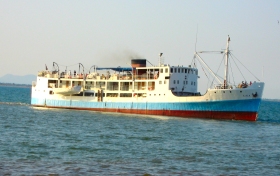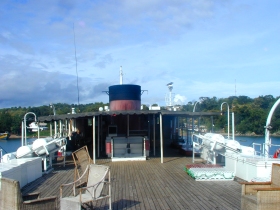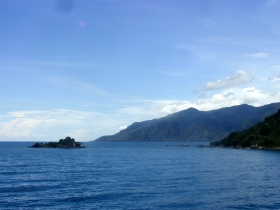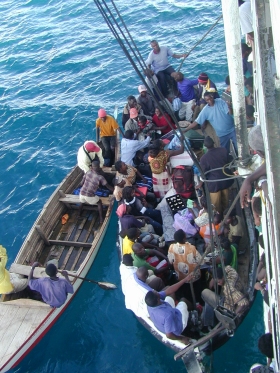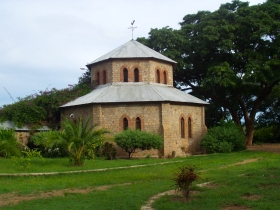- You are here
- Home
- Guide to Africa
- African Travel Articles
- Cruising Lake Malawi on the Venerable Ilala
Cruising Lake Malawi on the Venerable Ilala
Parent page
Written by Jane Golden (a travel writer and novelist)
Just the name brings back so many memories that I am sure I must have spent a year on it rather than a mere four days.
The Ilala entered into our souls at a time in our lives when we needed it the most – a time when all we craved was to escape the news and chaos. We wanted a trip to a place without pretensions or condos with palm trees in pots and afternoon swim exercises. Thus it was on the first Christmas after the hurricane that our little group of pilgrims landed in Malawi – in the rainy season.
It was to be the highlight of our trip; a first class cabin on the top level of the only cruise ship plying Lake Malawi - and a personal tour of Likoma Island. I had no idea what to expect, but I should have known this was not a Viking Cruise when it was suggested by a friend that we bring our own towels, bed linens, and extra food to eat. And, if not then, my instincts should have kicked in when he took us to a tiny market and bought a can of DOOM bug spray for our room just in case. But, I had high hopes for this trip and refused to allow any doubts to creep into my mind.
The Ilala is a 172 foot long vessel built in 1949 with three levels for passengers –first class staterooms on the third level and steerage on the bottom for animals, cargo and the people who stayed with their cargo. In between were second and third class areas. It had been a Grand Dame in its heyday – lots of stainless steel, teak, mahogany and style. The large flat area on the top held the life boats and a Tiki type bar, with an ample area for sitting or sleeping. I could envision it new with men in white linen suits and women with cigarettes on long silver holders lounging on teak recliners, reaching for cocktails from waiters in black bowties.
Sixty years later much of the small ship's glorious heritage past has faded along with the people who once enjoyed it. What has now replaced the sheen of the Ilala's past is a reliable rhythm that comes from a predictable passage from port to port, one that its passengers know and have come to rely upon for decades.
We, the cabin class passengers, were told by a Malawian to bring onboard our own webbed aluminum chairs for sitting on the deck outside our room with the other first and second class occupants. We were glad we did for much of what we learned about African life was while lounging in those chairs.; Each day a group of mostly older white and African men who knew each other or of each other, lined up against the steel walls of the staterooms gazing toward the lake, all the while pontificating about the fate of Malawi.
When we arrived at our stateroom, backpacks full of linens and carrying webbed chairs, I still clung to the optimism that this would be first class room in the traditional big cruise-line sense. There would be in-room coffee and a good reading lamp. I would be pampered.
I was not prepared for the stateroom's austerity. Even with my own sheets and cleaning products, plus the DOOM, just in case, it did not invite you to stay inside. The small sink and the dark walls boxed around a bed, no air conditioning and one small window for ventilation were not inviting. But they were as they always have been and were meant for sleeping at night when heat might moderated - not for retreating during the day. My husband and I did not comment on the accommodations. What could we say? Our son opted for sleeping outside in the evening breeze with most of the other younger passengers even before he saw his room. He had given up his berth to an elderly passenger in what we thought at the time was a magnanimous gesture.
However, I was determined to shake off my vestiges of privilege. As the only woman on our deck other than the young cook, I had no tribe to join in my indignation over a lack of "proper"" first class accommodations. I was fortunate to have a room at all and resolved to embrace it.
The weather did not make it easy. It was hot, still, and 100% humidity as the boat chugged from one port to another on its way around the giant freshwater lake picking up and dropping off passengers, animals and cargo. With never enough speed to cool you off the heat took its toll, even for those of us who grew up in the Deep South. The Tiki bar with its liquid refreshments called to me. It was there I had my first cold Carlsberg beer. When I popped its top and tipped it back, it tasted like a refreshing river of ice slipping down my throat. I can still remember holding the frosty container against my skin to defuse the afternoon heat.
Gradually the boat began to fill with more people. I began to focus upon them rather than my momentary unattractive lack of gratitude. Recognizing it would be a long trip I switched from beer to water and met the new passengers from cabins on the upper decks. There was a group of nuns on their way to Likoma Island, some backpackers from Europe, an eager American Peace Corp worker and her shocked parents from California, a few missionaries headed to the orphanage, and a mix of others who for some reason were on this voyage. There were no random tourists.
The Malawian women were typical of most I had met - very demure with long colorful skirts, beautiful skin and bright happy faces. The backpackers on this trip were filthy and loud, dressed inappropriately for their shipmates or worse, not dressed at all. The Peace Corp worker - the best of American youth, was dressed like the Malawians, but with TEVA sandals. Her intelligent eyes quietly absorbed the activity around us - leading a Malawian to tell us that this is why they often do not like the backpackers and love the Peace Corp workers. Just at that moment one of the backpackers dropped his pants revealing his lack of undergarments and deliberately changed from his damp clothes right in front of the cluster of nuns. I secretly hoped the parasitic worms would take up residence in his shorts hanging on the lines.
The little Peace Corp worker's parents, on the other hand, were the only middle class Americans like us on the Ilala. They told us about a nightmarish car accident a day or so earlier that had left them in a state of shock. Repeatedly they said how much they were looking forward to recovering on thw "cruise" in their first class stateroom and then spending few nights at a resort near Likoma. I did not have the heart to ask them if they brought DOOM.
About seven hours into the trip the Tiki Bar ran out of bottled water. It had been a dollar a bottle and I believe the most expensive item I bought on the entire trip. I began to order cokes – tall glass bottles filled with cold dark elixir made with real cane sugar. They were 75 cents each. At that point I was no longer concerned about caffeine or calories. The cokes lasted another hour or so. That meant the bar was left only with beer for the remainder of the trip. The upside was that they cost a mere 35 cents each. When I saw my underage child sitting on a stool, sipping a cool one while talking to the African workers there was nothing I could say. I rationalized that he would learn more in that experience than a year of school would teach him. Plus, he was thirsty and I like to believe I am no tyrant.We found idle ways to spend the time. My first plan was to survey the boat in search of safety items such as life preservers and boats – just in case. I found that there were life boats – the soft-sided inflatable ones in large round metal containers on the roof of the ship. I checked out all of them only to discover that the newest one was last inspected more than twenty-five years ago. My heart skipped a beat. But I soon realized how old they were really didn’t matter – there appeared to be only enough for a quarter of the passengers and I was not sure anyone knew how they operated. I went down to level three and forced my husband from his mesh seat to confront the indisputable “evidence” of impending death in writing on the side of the lifeboats.
He came with me, saw the offending boats, nodded and bought a beer. Then he wandered back to the webbed chair gang. It was fruitless to worry. Eventually, our little family found interests outside of each other. Our son became the friend of a young Malawian not much older than he who was working on the ship. I be-friended the young woman who was a cook. My husband remained with the men in the chairs along the staterooms.
The young mother mostly sat on a stool outside the kitchen huddled over an old cell phone playing games. There was no service, and in the unlikely event there was service she could not afford it. Pretty and wearing a typical sleeveless top and long sarong around tied at her waist she was emblematic of the young smart Malawian woman with little opportunity. Her four year old daughter, a mini-me with the same dark eyes, luminous brown skin and perfect smile, played sweetly by her side. The cook’s “kitchen” was a minimally outfitted room at the end of our level with a large mound of cabbages piled on the ground. I thought, perhaps, there must be another kitchen somewhere.
It took quite a bit of local gin to make me sleep that night and in retrospect I am not sure how I managed to do it. But, it was all forgotten when I awoke to a glorious morning – still blue waters and beautiful skies with a lush green coastline on the horizon. We were due on Likoma Island that afternoon, but first the ship was to stop on the shores of Mozambique to pick-up some cargo. It had been a good harvest and burlap bags full of food and grain were piled high on the white sand beach, one of many stops before they reached their destination.The landscape a few hundred feet off the stern of our vessel was one that Dr, Livingston might have witnessed a hundred and fifty years ago. Wooden huts with thatched roofs devoid of electrical lines dotted the shore. There were no cars or anything resembling a “Trader Joes” along the crescent shaped cove. All I saw were some crude dug-out canoes on the beach and a handful of people standing incredibly erect and patiently waiting for us to drop anchor. On this day it seemed as pristine a beach as I have ever encountered, but sadly we could only watch it from afar while the cargo was ferried to the vessel. This was not a Norwegian Cruise and there were no added excursions.
Soon it was midday and excruciatingly hot. Clouds teased us in the distance, but there would be no sweet gentle rain to relieve us. It was not long before the back-packers shed their clothes – at least this time with a purpose although they seemed to relish in their exhibitionism - and dove off the boat into the deep waters surrounding it. My son joined them, but thankfully in a bathing suit. I worried about the parasites and crocodiles, but said nothing. The water was crystal clear. They were cool while I sat smoldering in the sun.At some point the loading operation took over my attention. Each time the Ilala listed to the right I became concerned. For hours on end a small open boat would be filled with bags of cargo from the shore until its gunnels were almost under water and then with the toil of a few young men would somehow make its way to the ship. Each time I held my breath, worried that the boat would sink on its way. Then, when the little boat arrived a mass of people on the lower level would help lift the cargo aboard, hoping to hurry the laborious operation. Each time the weight of the cargo and people loading it would tip the boat over so far that I worried it would cause accidents.
Eventually it became clear in the tedium that our wonderful afternoon tour of Likoma Island would not occur. It would be nightfall before we arrived, though I feared our hosts would not be aware of this delayed arrival. There would be no calling ahead or texting a note “stuck loading cargo – hold the cocktails.” I gave in to frustration. Even if I wanted to scream “This is so insane! Who loads a ship like this? Who is the idiot running this operation?” it was only the California couple and me who really cared when we arrived. Reluctantly I had to admit, but only to myself, that perhaps we three were the ones with the problem.
Likoma Island was a mere seven kilometers from the shore where we mercifully concluded loading the fruits of a very good harvest season. It was dusk when we weighed anchor and chugged toward our destination. As luck would have it, a storm appeared just as the helm headed to the island. It wasn’t just a storm – it was the kind of epic storm immortalized in songs wherein ancient mariners were lost at sea, or in our case dumb Americans on the continent’s deepest lake perish with a boatload of vegetables. The black sky let loose large drops of rain that stung if you allowed one to land upon you. Lightening lit up the skies above us with strikes perilously close to the boat. All the while waves crashed against the hull and rocked the boat enough to make a seasoned sailor queasy. The storm blew until I was convinced that there could be no more rain left in Africa.
When it finally ended I discovered that the Ilala was able to weather a fierce storm with little effort. It was a welcome discovery. At mid-night we were able to drop anchor off the shores of the now pitch dark island. Dozens of small wooden boats lit by lanterns, some with motors, most with oars, had been waiting many hours to take those destined for the island ashore.
It was still lightly raining and the water choppy when I was told I had to crawl down the ship’s ladder to our host’s tiny wooden boat knocking back and forth against the hull. Although I was skilled in boating, or perhaps because I was, this operation looked and felt incredibly dangerous. One misstep and I would have a fractured femur. Yet, once again I followed.
When safely aground, albeit rattled and wet, our little group headed to the hundred year old St. Peter’s Cathedral on the top of the hill at the end of the washed out main road. There, standing in the dark at the entrance of the cathedral was a young man from Likoma traditionally dressed in mostly black attire, patiently waiting for us. He had a key, umbrella and a flashlight. He was not the person we were expecting.“No worries,” we were told. “He will handle your tour.”
Our guide to the church then rushed away to meet with some people over issues on the island. We were left in the dark to tour the scariest church I had ever seen, to be led around by a strange man dressed in black. Its massive stone walls were only illuminated by the occasional strikes of nearby lightening, making it appear increasingly ominous. You have to know me – the one who never watches horror movies –to understand that I interpreted the scene as foreshadowing something really bad. But still, ever the trooper with no other options, I plowed through the wooden doors into the cavernous cathedral said to be larger than Winchester Cathedral. We walked in single file – our guide with a simple flashlight, my husband, me and our son – all the while my heart pounding in my chest. I wanted this tour to end before it began.
The Cathedral was an impenetrable black darkness and the loud rumbling thunder was too much for me to endure. The flashlight would periodically shine on something important, but it was too small to show much. In any event, my head was mostly looking toward the ground. I kept stepping on my husband’s ankles in the dark. He would then instinctively turn to me just in time to see me swatting at my head and ducking down like a boxer avoiding punches. I looked crazy. The history I should have been learning was overshadowed by my fear of falling or being consumed by some unknown terror. It did not help that there were bats and I continually felt them breezing by my head.
Without warning two other men approached us out of the dark. Our solitary guide seemed somewhat surprised but showed no emotion after they spoke. It was clear that this was not part of the plan. I could sense concern creeping into my husband as he watched the exchange. We had no idea what was happening even after they tried to explain. Broken English did not help. All we heard was “change”. Finally, they motioned for us to follow them down along narrow hall into the cathedral’s bowels.
Each step added dread to my heart. Malawi is very safe, but I could not ignore my fear that these men might be from one of those ever-increasing pockets of radicals dotting the landscape of nearby countries. It was just as I could sense my husband seeking a possible escape route that one of the men reached into his jacket. Everything stopped for a moment – our breath and their steps. It was hard to see in the dark but I saw him pull out what I thought was a key – not a gun – a thought confirmed when he proceeded to ceremoniously use it to unlock a wall vault.
Our combination of bewilderment and lingering worry remained until the elder of the men lifted a large wrapped object from the vault and placed it on the table before us. We stood quietly as the man slowly unwrapped his package as if it were a precious gift. You could hear air leave our lungs when we first realized we were looking at the cathedral’s historic bishop’s staff. It was not overly ornate or ostentatiously overlaid with gold and jewels like a Pope’s or King’s crown. Though I imagine the staff was much less valuable than one dripping in jewels, I am not sure I have ever seen anything so perfectly crafted and possessing a more important meaning. It was their treasure. With a handle carved from a branch of the tree that Dr. Livingston sat under to sign the treaty to stop slave trade and lit only by candles and flashlights, the staff’s mystical qualities left us speechless. History states that the staff was given by a local Chief to the cathedral to make amends after a missionary was killed. Up until then nothing made much sense, but it had all been worth it – the boat-trip, the storm, my ridiculous fears. Who would have known that at the end of the day we would experience this one intense moment of rare privilege? I stood in silent wonder.
After sometime the older man knew we had seen enough and they reverently returned the staff to its vault. We retraced our steps back up through the church to resume our tour. No one spoke - we were quiet and contemplative. It was when we were still lost in our thoughts and standing near the altar that the church became suddenly lit, startling us. It was a beautiful scene. The altar, vaulted ceiling and historical objects became alive with new meaning, making me wish I had listened better on the tour. Other local residents had arrived to join us. I was unsure if they caused the light to appear, but they seemed as happy to see us as we were to see them. Our voices echoed inside the sanctuary as we made introductions and talked about the day’s storm.
Laughter erupted when my son entertained our new hosts by describing how he had blown air into the back of my head and hair during the tour to make me think there were bats swooping down upon me. As he imitated me dunking, everyone, especially the Malawians, thought it was hysterical. I did not know until then that juvenile behavior was so universal in men.
We arrived back at the Ilala at daybreak and fell fast asleep. The bad weather was over for the remainder of the trip and the heat had moderated a bit after the storm. When we awoke, blue skies, calm seas, and distance verdant shores with mountains met our gaze. If you just stayed in your transportable chair, sipped on a gin (we brought a lot), talked about the future with your deck mates and looked toward the far off green horizon it was as wonderful as a cruise in Hawaii. By then I had completely eased into my new life on the Ilala. The last morning, for the first time, I visited the port side of our still proud vessel. As I turned the corner of the passageway I was shocked by sight of thousands of rare cichlids, a tropical looking fish from Lake Malawi, all swimming in plastic bags filled with water like ones you would win at the county fair. They were just there - lying on the shady side of the Ilala. Exotic fish destined for the most outrageously expensive aquariums in the world and there they were – gulping for oxygen in plastic bags – the kind of small plastic bag with a goldfish inside that we won as children at a circus game. I worried that half of them would not survive. There was no aeration, no protection from the heat – not even a person near them. I am sure their exhausted captors were asleep as it was clear in this land of few working boat motors, less dive shops, the method of catching was as primitive as the method of keeping them. My mind whirled as it often did in Africa, thinking of a better way to do this, and then remembering that there was little I could do to change things like this. It was frustrating, but morbidly interesting to watch them so close up in their new homes for the next few hours. I knew I was unlikely to ever again study such beautiful and rare fish.
It was hot once again and we were all hungry when the Ilala was finally reached Monkey Bay, our final destination. We were told acquaintances were at the dock to take us to eat and I did not want them to wait too long. Therefore, instead of waiting for the lower decks to disembark first, I stood in line with all of the other passengers. I watched as some passengers did not wait for the exit ramp to be secured and they began scaling down the outside hull like monkeys – then dropping to the wooden pier below. I felt sure someone would break a leg or fall between the dock and the boat but I never heard a scream or a splat.
When it was finally time to alight people around me began to push forward – first gently and then urgently. The hot and sweltering crowds began to move as if at a rugby match, bodies against bodies. I was not prepared for this. I clutched my backpack in front of me as I was propelled forward. Suddenly the crowd acted as if we would all die if one person was left on the ship another minute. It became oppressive. I searched for the men and a way out and they were nowhere to be seen. I started to panic when I realized there was no escape from the crowd.
By then I was so smothered with bodies that my one of my shoes came off when people behind me stepped on my heels. It was impossible to see where the shoe went much less get it as the people behind me pressed forward. My heel was bleeding. I saw children clinging to their mothers and wondered how they could stay attached.
It went on like this for what I felt must have been at least ten minutes – a mass of silent people streaming like a hoard of ants one on top of each other, barely breathing, until we were expelled from the ship. I felt enormous relief when I was safely on the dock as if I had finished some extreme sport. I looked back expecting to see carnage and frantic people. There was none. No one else was limping and no one had been trampled. Everyone else still had their shoes and belongings. No one had lost their child. I shook my head in disbelief. Apparently, it was only me that was unprepared for the normal exit routine.
When I finally joined my husband and son on the dock, laughing with our lunch hosts, I was still limping with only one shoe and taking deep breaths.
“Where were you?” they asked.
When I tried to explain, momentary confusion crossed their faces.
“Why didn’t you just crawl down the side and jump like we did?”
I did not respond. What could I say? Had I changed that much while in Africa – so much that my husband and child would think I would do something so reckless without giving it a second thought? Did they think I would clammer down the hull of a ship and drop to a wooden deck that might or might not be secure?
It caused me to recall that moment when we were en-route and laid over in London. It was there we met an Anglican priest who had spent some time in Malawi. He took time to bless us and pray for safe travel. We parted on his words: “Malawi will change you forever.” As I watched my two men attempting to shade their smiling sunburned cheeks with hands over their eyes, I had to agree. This trip had changed them back to who they were before the hurricane - maybe even better. They were happy, relaxed and energized. Slowly and with more resistance, Malawi had also changed me - the cautious woman whose careful plans for the rest of her life had been blown away. Malawi suddenly made me feel free in a way that only shrugging off worry can do. As crazy as it sounds, I knew that the next time I took the Ilala there was no doubt about it - I would climb down the side and jump. Or I would wear lace-up shoes. I looked up towards my former stateroom and hoped that the Ilala had many more years of trips around the lake.
Then, as everything does in Malawi, the day was once again magical. I relaxed in my worn rush chair at a large outdoor table under the shade of a tree with enormous leaves. We devoured a feast of fresh fish, French fries and bread with our new Malawian friends. The sand from the beach extended to our table and I slipped off my one shoe and dug my toes into the coolness underneath the surface. As we talked of local issues and needs of a small educational NGO over an ice cold coke, I drifted in and out of the conversation. I could not help but ponder Lake Malawi’s future. The flawless white sand beaches, tropical trees, azure water and exotic fish, all surrounded by lush green hills, still looked as God intended for them to look. I watched as a woman hung clothes from the nearby lines while her children played at the water’s edge. I saw young men jump into dug-outs to go fishing just as their ancestors had done before them. I listened to the soft sounds of the conversations around me and the birds singing in the trees, happy the rains had finally come and it was mating season.
There were no tourists or loud bars – just the drumbeat of a different world with thunder in the distance.
Some scenes from cruising down the lake on the Ilala
Visit Jane Golden's"Secret in the Vines" website
